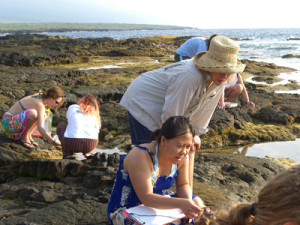KBEC Programs: Tidepool Investigation
 Our tidepool investigation lessons start with a discussion of the intertidal zone and its characteristics. We talk about some of the conditions found in the intertidal zone that make it more difficult for organisms to survive (e.g., regular exposure to air, drastic temperature changes, wave action, feeding restrictions, and water loss). We then ask the group to consider what kind of adaptations an organism would need in order to survive there. Many of these characteristics are visible in the invertebrates that we discover during the later part of the activity.
Our tidepool investigation lessons start with a discussion of the intertidal zone and its characteristics. We talk about some of the conditions found in the intertidal zone that make it more difficult for organisms to survive (e.g., regular exposure to air, drastic temperature changes, wave action, feeding restrictions, and water loss). We then ask the group to consider what kind of adaptations an organism would need in order to survive there. Many of these characteristics are visible in the invertebrates that we discover during the later part of the activity.
The second part of the discussion focuses on invertebrates: what they are, basic body plan, and interesting facts such as how they compose 95% of the species on earth and that here in Hawai‘i, 20% of invertebrates are endemic. We describe different invertebrate phylums and look at why these organisms are categorized as such. Pictures of invertebrates are passed around; we ask the group to look at how invertebrates are adapted to protect themselves and at what threats they may face. Each participant in the group is given tidepool identification sheets, an ID sketch sheet, a clipboard, and a pencil.
During the exploration part of the lesson we encourage participants to make observations. We head into the tidepools and begin looking for different invertebrates. Rocks are turned over gently, and discoveries are made. Each participant is asked to sketch four different organisms from different phylums. They are asked to mark features that characterize the phylum and to explain what other adaptations the invertebrate has that helps it to survive in the intertidal zone. The instructor is available to help identify different invertebrates and ID books are also on hand. Overall, it is a really fun lesson in exploration and observation.
Email info@kohalacenter.org or call 808-887-6411 for more information.
Our Other Programs
ReefTeach
Our program educates visitors on how to avoid damaging corals and take care of honu (green sea turtles) and reef animals.
Citizen Science
Citizen Science is both an ecosystem health monitoring program and a community education and training program.

